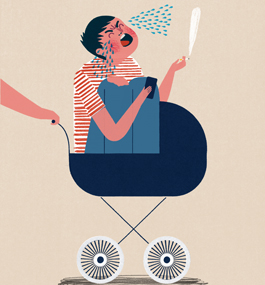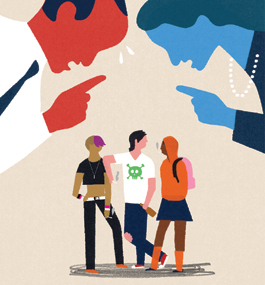Everything You Know About the Teen Brain Is Wrong
Angst and anger aren’t inevitable parts of the teenage experience.

Keith Negley
by Robert Epstein ’74
For most of human history, virtually everyone in the world believed the world was flat and the center of the universe. Most people still believe that a god created people, the earth and the rest of the universe just a few thousand years ago. This god has quite a sense of humor, apparently, he or she having stocked the earth’s strata with the fossils of animals that have been extinct for millions of years. Good one, god.
My point is that humans are not particularly clear thinkers. Generation after generation, the vast majority of us have steadfastly believed things that were entirely wrong, with only an obscure guru squatting in a dark, dingy cave somewhere knowing the actual truth.
I am one of those gurus, and, believe me, all that squatting is not easy.
Nearly 20 years ago, having noticed, uncomfortably, that my 15-year-old son seemed more mature than I was, I began wondering why he wasn’t allowed to drive, own property, open a business, drink alcohol or start a family. I “knew” that teens are all inherently incompetent and irresponsible, but he seemed to be neither. I “knew” that teens needed adult supervision and protection 24 hours a day, but he seemed to need neither. I also “knew” that teens couldn’t help being depressed, angry and generally screwy because nature made them that way.
Justin got angry at times, but what he was angry about — or so he said, anyway — was that I was treating him like a child when, in fact, he wasn’t. But I was supposed to treat him like a child, wasn’t I? Advertisements and articles and TV shows tell us we’re supposed to monitor our teens, search their rooms and take away their car keys, because they are incapable of making sound decisions. Right?
Still, Justin didn’t fit the profile, and I began to wonder: Are all teens in the world as messed up as American teens? Were teens always as disrespectful and reckless as they are today? Were they always prevented from working and forced to go to school, no matter how qualified they were to work or how frustrating the school experience was for them?
My curiosity set me on a course of discovery that has been difficult for me over the years. As I became increasingly immersed in historical data, anthropological and sociological studies, volumes of research in psychology, and, eventually, my own extensive survey data, it was especially difficult for me to face the fact that many of my own beliefs about teens were wrong — which implied, of course, that my parenting skills were lacking. It has also been difficult for me to watch a steady parade of so-called experts in neuroscience and psychology, some of whom I know personally, continue to reinforce faulty beliefs about teens. Isn’t truth supposed to “out” — to rise to the top like the cream in fresh milk?
Not always, it seems. When it comes to teens, American society has been steadily moving in the opposite direction for more than a century — away from the plain truth and toward more and increasingly outrageous fictions.
The “teen brain” idea is one of the newest fictions, driven by three powerful factors. First, neuroscientists have identified small differences between the brains of teens and the brains of older adults. (But brains change throughout our lives, don’t they? Why is that particular age demarcation singled out?) Second, the pharmaceutical companies, always in search of new markets, have promoted the teen brain idea because the obvious fix for a defective brain is medication. And third, parents with troubled or troublesome teens want easy explanations and remedies that absolve them of any wrongdoing. One result: In the U.S., more money is now being spent on psychoactive drugs for teens than on all other prescription drugs for teens combined, including antibiotics and acne medication.
But the assertion that teen turmoil is a natural and inevitable result of properties of a developing brain is completely false. It is not even slightly true, no matter how prestigious or distinguished the source of that assertion.
Correlation versus causation
Correlation does not imply causation. Let me put that slightly differently: Correlation does not even imply causation. I’d wager that all the people who make fraudulent claims about the teen brain these days were taught this important principle in their introductory college courses, yet they violate it every time they make those claims.
The principle is crucially relevant to the teen brain concept because all the studies used to support this myth are correlational. They simply document average differences between the brains of teens and the brains of older adults. These differences are then said to explain the fact that teens in our culture are often troubled or troublesome. In other words, researchers start with the observation that teens behave differently than older adults in some respects, then notice differences between teen and adult brains, and voilà! They conclude, absurdly, that the brain differences cause the behavior differences. See the problem?

Keith Negley
page 2 of 2
Experts who explain teen turmoil this way are making exactly the same reprehensible mistake that experts made a century ago when differences between the skulls of blacks and whites were said to show that blacks were inferior. That explanation, offered for decades by distinguished scientists and scholars, was common in textbooks until at least the 1940s and remained part of the public consciousness for decades beyond that. Today’s headlines, magazine covers and textbooks pushing the teen brain idea are every bit as incorrect and misleading as those old textbooks were.
Neuroscience does teach us one thing that is relevant to interpreting teen brain studies, and that is that our experiences — upbringing, education, nutrition and so on — change our brains. Since teens and older adults have very different life histories, couldn’t this factor alone account for differences in their brains? How do you know what’s causing what?
The lack of teen turmoil in other cultures
For the sake of argument, let’s say that inherent, developmentally unavoidable properties of the teen brain do cause teen turmoil — anger, depression, risk taking, conflict with parents and drug abuse. Again, brain studies don’t actually show a causal link, but let’s assume for the moment there is one.
In that case, we should see teens in turmoil in every culture on earth, just as we see puberty in every culture. But anthropological studies conducted over the past hundred years show that the tumultuous stage of life we call adolescence doesn’t exist in many cultures. In fact, many cultures don’t even have a word for adolescence.
Anthropological studies also show that where teen turmoil is absent, full-blown, pathological adolescence starts to appear within a few years after a cultural group is exposed to Western media and adopts Western-style rules governing education and work. Beginning in the 1980s, this phenomenon was carefully tracked over a period of decades by multiple teams of anthropologists working under the direction of Beatrice and John Whiting, faculty members at the Harvard Graduate School of Education. In long-term studies conducted in Kenya, Morocco, Australia, Côte d’Ivoire and elsewhere, as well as with the Inuit people of northern Canada, researchers saw many of the problems of adolescence emerge as Western media and educational practices worked their magic. Ten years after the Inuit people got their first televisions, juvenile crime had become such a serious problem that they had to establish their first police force to combat it.
Teen turmoil is absent in cultures that preserve the natural “child-adult continuum,” a cultural pattern that assures young children a smooth transition to adulthood by allowing them to assume various adult responsibilities as soon as they show interest and readiness. Modern Western culture does just the opposite: It prohibits young people from entering the adult world, no matter how interested or competent they are, strictly on the basis of their age. As you might expect, many of these young people react with depression or defiance; they feel like they’re being treated like children, which they know they’re not. Wouldn’t you react that way? Come to think of it, didn’t you?
 |
|
Sidebar Story |
 |
To make matters worse, in countries like the U.S. teens are trapped with their peers in a largely vacuous subculture completely controlled by specialized divisions of the fashion and entertainment industries, which depict adults (and parents, especially) as the enemy. In the U.S. since the early 1900s, corporations have stoked the fires of adolescence — and even prolonged it — for one simple reason: American teens are the first large population in history with substantial income that is entirely disposable. A recent national survey suggests that teens are spending more than $250 billion a year, most of which comes from their parents and almost all of which is spent on junk teens are urged to purchase by icons and idols who are manufactured overnight by media executives.
In the U.S., teens spend more than 60 hours a week with the last people on earth from whom they should be learning: their peers. In traditional cultures, teens spend only about five hours a week with peers. Most of their time is spent learning to become adults by working side by side with them.
In short, there is overwhelming evidence from multiple fields that adolescence is caused by cultural practices, not the brain. These practices do two things to young people well past puberty: infantilize them — that is, control and restrict them as if they were still children — and isolate them from responsible adults, trapping them in the inane world of teen culture.
Am I suggesting we should revert to tribal ways to eliminate teen turmoil? Not at all. But adolescence is an unnecessary stage of life that can and should be eliminated. In my book “Teen 2.0” and other writings, I show how this can be done in a modern context. For example, rigorous competency tests could be used to determine whether individual teens are ready to be awarded various adult rights, even to be emancipated.
Given opportunities to enter the adult world, even just partially, millions of teens would turn their attention away from teen culture and toward a much bigger prize.
Robert Epstein, who earned a PhD from Harvard University, is the former editor-in-chief of Psychology Today and the author of 15 books. He is currently senior research psychologist at the American Institute for Behavioral Research and Technology, in Vista, Calif. He is also the proud father of four, two of whom are still teens. For more information about his research on adolescence, visit Teen20.com or the adolescence page at DrRobertEpstein.com. To take his test on how to parent teens, visit TeenParentingSkills.com. And to take his test of adult competence, visit HowAdultAreYou.com.
